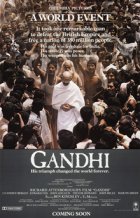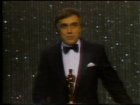
Gandhi Page #2
- PG
- Year:
- 1982
- 191 min
- 1,856 Views
Godse swallows dryly, tension lining his face -- then he
moves boldly out into Gandhi's path, bumping Manu, knocking
a vessel for incense from her hands.
MANU:
(gently)
Brother -- Bapu is already late for
prayers.
Ignoring her, his nerves even more taut, Godse joins his
hands together and bows in greeting to the Mahatma.
And now we see Gandhi in full shot. The cheap glasses, the
nut-brown head, the warm, eager eyes. He smiles and joins
his hands together to exchange Godse's greeting.
Godse moves his right hand rapidly from the stance of prayer
to his jacket, in an instant -- it holds a gun, and he fires
point blank at Gandhi -- loud, startling -- once, twice...
thrice.
Gandhi's white shawl is stained with blood as he falls.
GANDHI:
Oh, God... oh, God...
Amid the screams and sounds of chaos we dissolve through to
KINGSWAY - NEW DELHI - EXTERIOR - DAY
Close shot. Soldier's feet moving in the slow step, half-
step, step of the requiem march...
Full shot. The huge funeral procession -- crowds such as
have never been seen on the screen massed along the route.
People everywhere, clinging to monuments, lamp standards,
trees -- and as the camera pulls back from the funeral cortege
it reveals more and more... and more. All are silent. We
only hear a strange, rhythmic shuffling, pierced by an
occasional wail of grief. We see the soldiers and sailors
lining the route, their hands locked together in one seemingly
endless chain. We see the two hundred men of the Army, Navy
and Air Force drawing the Army weapon-carrier that bears the
body of Gandhi.
And finally we see Gandhi lying on the weapon-carrier,
surrounded by flowers, a tiny figure in this ocean of grief
and reverence.
THE COMMENTATORS' ROSTRUM - KINGSWAY - NEW DELHI - EXTERIOR -
DAY:
Commentators from all over the world are covering the
ceremony. We concentrate on one, let us say the most
distinguished American broadcaster of the time, Edward R.
Murrow, who sits on the makeshift platform, a microphone
marked "CBS" before him, describing the procession as
technicians and staff move quietly around him.
MURROW:
(clipped, weighted)
...The object of this massive tribute
died as he had always lived -- a
private man without wealth, without
property, without official title or
office...
KINGSWAY - NEW DELHI - EXTERIOR - DAY
As the cortege continues on its way, we get shots of the
marching soldiers, of the faces of Sikhs, and Tamils, Anglo-
Indians, Moslems from the north, Marathas from the south,
blue-eyed Parsees, dark-skinned Keralans...
MURROW'S VOICE-OVER
Mahatma Gandhi was not a commander
of great armies nor ruler of vast
lands, he could boast no scientific
achievements, no artistic gift...
Yet men, governments and dignitaries
from all over the world have joined
hands today to pay homage to this
little brown man in the loincloth
who led his country to freedom...
We see the throng, following the weapon-carrier bier of Gandhi
as it slowly inches its way along the Kingsway.
Mountbatten, tall, handsome, bemedalled, walks at the head
of dignitaries from many lands... and behind them a broad
mass of Indians. For a moment we see their sandalled feet
moving along the roadway and realize their quiet, rhythmic
shuffling is the only noise this vast assemblage has produced.
MURROW'S VOICE-OVER
Pope Pius, the Archbishop of
Canterbury, President Truman, Chiang
Kai-shek, The Foreign Minister of
Russia, the President of France...
are among the millions here and abroad
who have lamented his passing. In
the words of General George C.
Marshall, the American Secretary of
State, "Mahatma Gandhi had become
the spokesman for the conscience of
mankind..."
In the crowd following the bier we pick out the tall, English
figure of Mirabehn, dressed in a sari, her face taut in a
grief that seems ready to break like the Ganges in flood.
Near her a tall, heavy-set man, Germanic, still powerful of
build and mien though his white hair and deep lines suggest
a man well into his sixties (Kallenbach). He too marches
with a kind of numb air of loss that is too personal for
national mourning.
On the edge of the street an American newspaperman (Walker)
watches as the bier passes him. He has been making notes,
but his hand stops now and we see the profile of Gandhi from
his point of view as the weapon-carrier silently rolls by.
It is personal, close. Walker clenches his teeth and there
is moisture in his eyes as he looks down. He tries to bring
his attention to his pad again, but his heart is not in it
and he stares with hollow emptiness at the street and the
horde of passing feet following the bier.
MURROW'S VOICE-OVER
...a man who made humility and simple
truth more powerful than empires."
"Generations to come will scarce
believe that such a one as this ever
in flesh and blood walked upon this
earth."
Translation
Translate and read this script in other languages:
Select another language:
- - Select -
- 简体中文 (Chinese - Simplified)
- 繁體中文 (Chinese - Traditional)
- Español (Spanish)
- Esperanto (Esperanto)
- 日本語 (Japanese)
- Português (Portuguese)
- Deutsch (German)
- العربية (Arabic)
- Français (French)
- Русский (Russian)
- ಕನ್ನಡ (Kannada)
- 한국어 (Korean)
- עברית (Hebrew)
- Gaeilge (Irish)
- Українська (Ukrainian)
- اردو (Urdu)
- Magyar (Hungarian)
- मानक हिन्दी (Hindi)
- Indonesia (Indonesian)
- Italiano (Italian)
- தமிழ் (Tamil)
- Türkçe (Turkish)
- తెలుగు (Telugu)
- ภาษาไทย (Thai)
- Tiếng Việt (Vietnamese)
- Čeština (Czech)
- Polski (Polish)
- Bahasa Indonesia (Indonesian)
- Românește (Romanian)
- Nederlands (Dutch)
- Ελληνικά (Greek)
- Latinum (Latin)
- Svenska (Swedish)
- Dansk (Danish)
- Suomi (Finnish)
- فارسی (Persian)
- ייִדיש (Yiddish)
- հայերեն (Armenian)
- Norsk (Norwegian)
- English (English)
Citation
Use the citation below to add this screenplay to your bibliography:
Style:MLAChicagoAPA
"Gandhi" Scripts.com. STANDS4 LLC, 2025. Web. 22 Feb. 2025. <https://www.scripts.com/script/gandhi_471>.







Discuss this script with the community:
Report Comment
We're doing our best to make sure our content is useful, accurate and safe.
If by any chance you spot an inappropriate comment while navigating through our website please use this form to let us know, and we'll take care of it shortly.
Attachment
You need to be logged in to favorite.
Log In